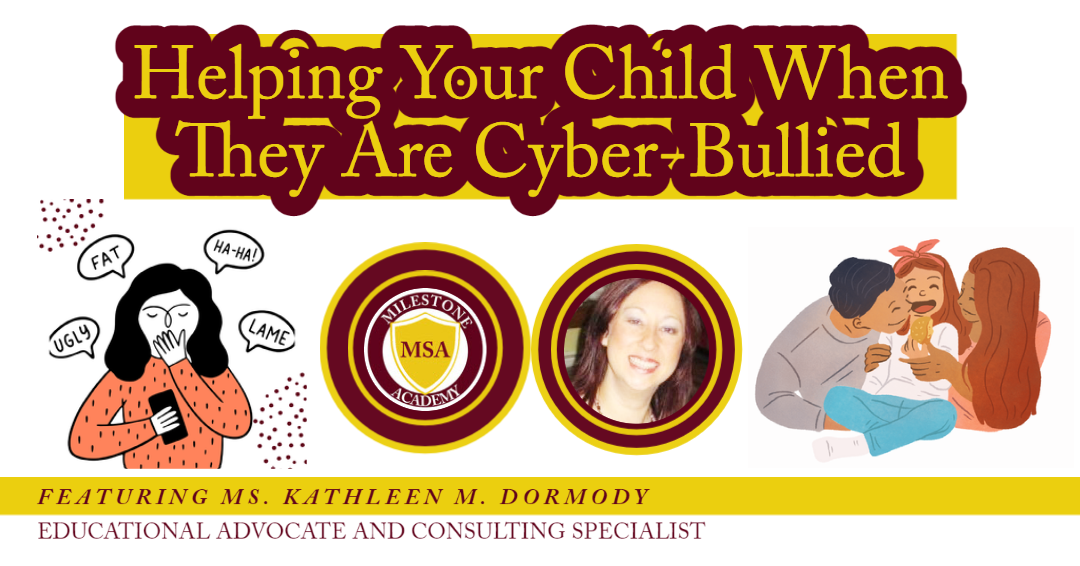
Foster the Skills You Need to Help Children Stay Safe on the Internet
What Is Cyber-Bullying?
Cyber-bullying occurs online via social media sites including Facebook, Instagram, Snapchat, TikTok, Reddit, message boards, chat rooms, or gaming communities over phones, tablets, or computers. It presents in emails, text messages, instant messages, rumors, or photos. Bullies post embarrassing or hurtful statements or photos to humiliate, harass, or threaten their victims. Bullies even hack into their victim’s accounts and stalk them online.
Since technology is always on, it consumes the lives of youth twenty-four hours a day, seven days a week; they cannot get away from the trauma. Sadly, many kids escape only by suicide when it becomes too much with which to cope.
Schools can educate students about cyber-bullying by tools and resources from The Bully Project.
What Can Youth Do If They Are Bullied On The Internet?
If you are being bullied online, talk to a counselor or other trusted adult. Act by not interacting with your bully. The internet has strict rules about online behavior.
If the harassment continues after reporting the incident(s), file complaints with email and internet providers, websites, and phone companies. It may be necessary to press legal charges; make sure you save all messages as proof. More ways to act against your bully include:
-
Blocking the person(s) bullying you.
-
Logging out of your computer and online accounts.
-
Changing your screen names, phone numbers, and email addresses.
What Can Youth Do To Prevent Being Bullied On The Internet?
You can prevent cyber-bullying by taking precautions. Before using social media, understand that no online activity is private; set your account settings to private, turn off your location, and do not share any personal information. A top-notch safety measure is to make parents aware of your accounts and give them the passwords. Precautions while online include:
-
Never communicating with strangers.
-
Never leaving your technical devices out of sight.
-
Not opening unknown or suspicious communications, such as emails or text messages.
-
Not posting comments that will offend or hurt others.
What Can Parents Do To Protect Their Children On The Internet?
Parents can best protect their children by setting boundaries with technology and parental controls. Warning your child about internet dangers is critical; teach them about the 4 Ps of internet safety: privacy, predators, pornography, and pop-ups.
Strong self-esteem can prevent a child from being bullied. Parents who build their child’s confidence keep them safer. Confidence building comes from being involved in what your child does online and keeping open communication with them. Other safety methods include:
-
Putting the computer in a public area.
-
Creating a separate user account for each user.
-
Telling your child you will check their online activity, files, and contact lists.
How Do I Know If My Child Is Being Cyber-Bullied?
Being bullied is traumatic, having short-term and long-term effects. Children present with many symptoms. Parents should look for lower grades, loss of friends, withdrawal from activities, low self-esteem, or anger. More severe signs of stress, anxiety, depression, or PTSD may be clear, including mood swings or self-harming behaviors such as running away or physical injury.
Other signs a child is being bullied include:
-
Insomnia or nightmares.
-
Fear of going to school.
-
Frequent feelings of illness.
-
Changes in eating including starvation or binging.
How To Support Your Child When They Are Cyber-Bullied?
There are many ways to support your child when they are cyber-bullied; teach them how to be assertive and handle bullies, keep them when they come forward, assure them it is not their fault, and help them act.
Parents also support their children by empowering themselves and working to prevent cyber-bullying. Examples of how to empower yourself as parents include:
-
Knowing your child’s online friends.
-
Knowing the technologies youths are using and how to navigate them.
-
Helping your child understand the difference between tattling and reporting.
Resources
The Cyber-Bullying Resource Center provides resources for parents, students, and educators on various aspects of cyber-bullying, including sexting, dating violence, LGBTQ+ students, tech misuse, and warning signs.
Other Resources
More About the Author, Kathleen M. Dormody: I am a copywriter and content creator with a background in education and a passion for doing advocacy work who enjoys volunteering. I am an intuitive, proactive, detail-oriented, well-organized, highly efficient, and creative thinker with excellent technical and presentation skills who can manage multiple projects and priorities. I write in a variety of styles and for a variety of audiences, and am excellent with building client relationships.
I am passionate about women and children, especially when it comes to empowering them to stand up for their rights, especially in regards to the issues of bullying, sexual and domestic violence, and embracing others’ differences and accepting them for who they are. My passions are fueled by my personal experiences and through the lives of people I have known.
My belief in lifelong learning and personal development continue to enhance my relationships and capabilities. Integrity is an essential core value I hold with high esteem.
I can enhance your organization or company mission, bringing its vision to life, and would love to discuss how I can serve your project initiative.
Here are some other MileStone Academy Articles and Blog Posts that may interest you:


